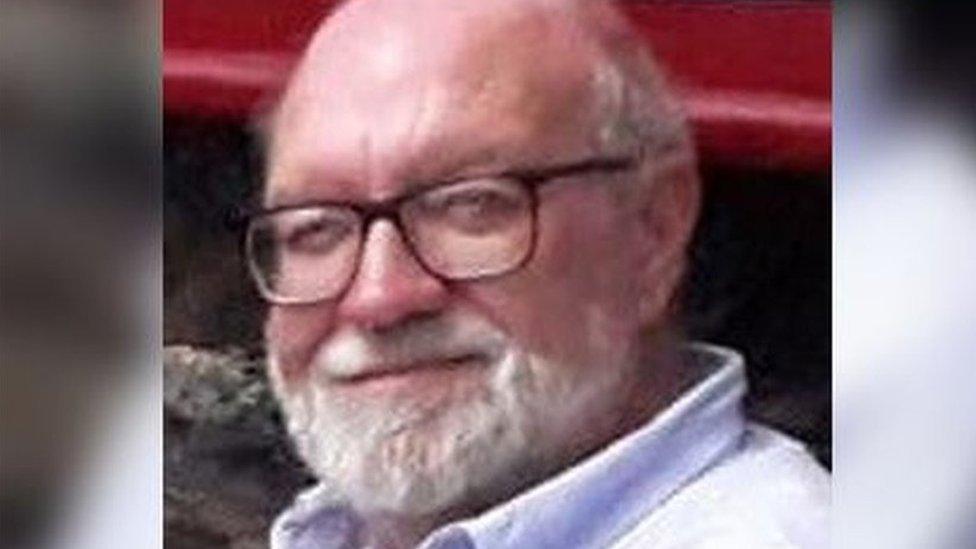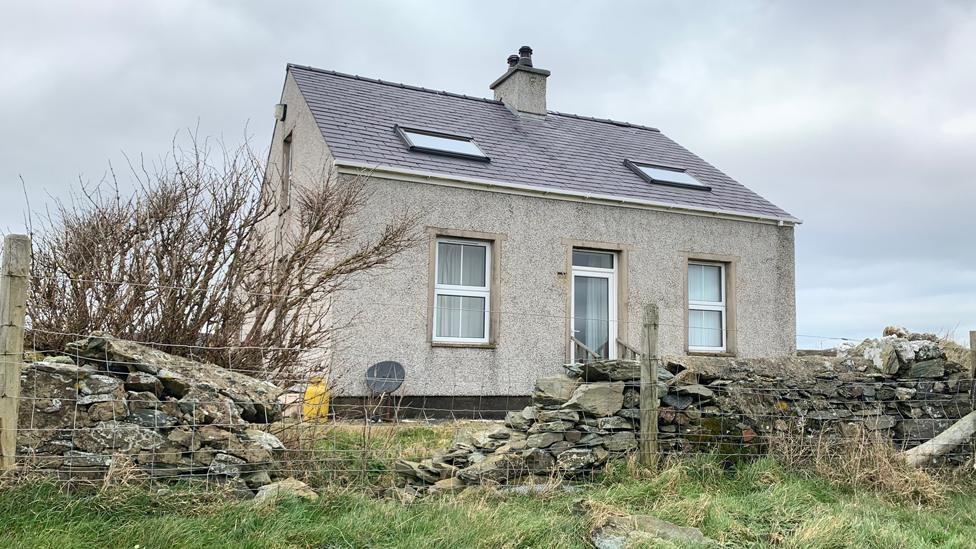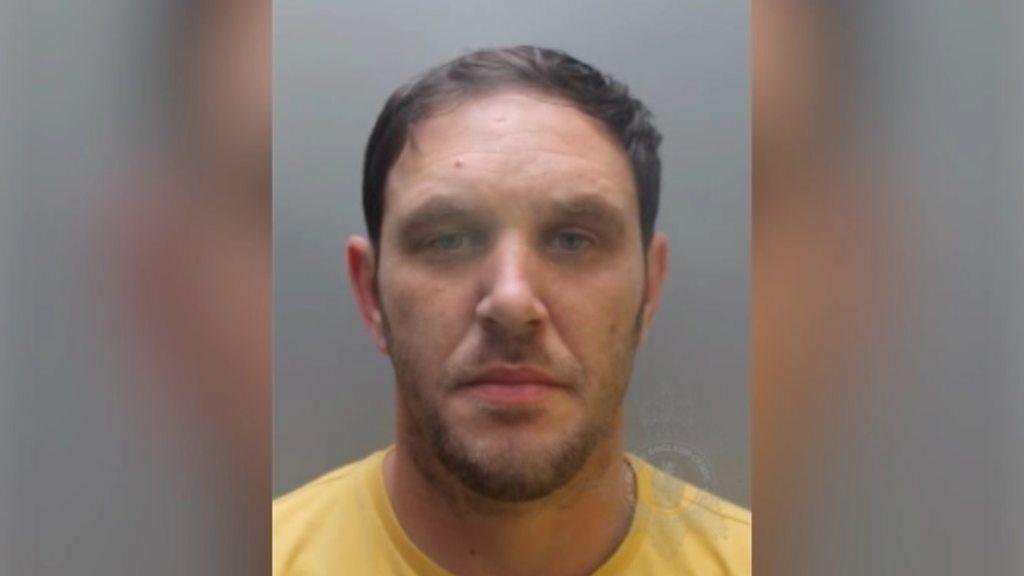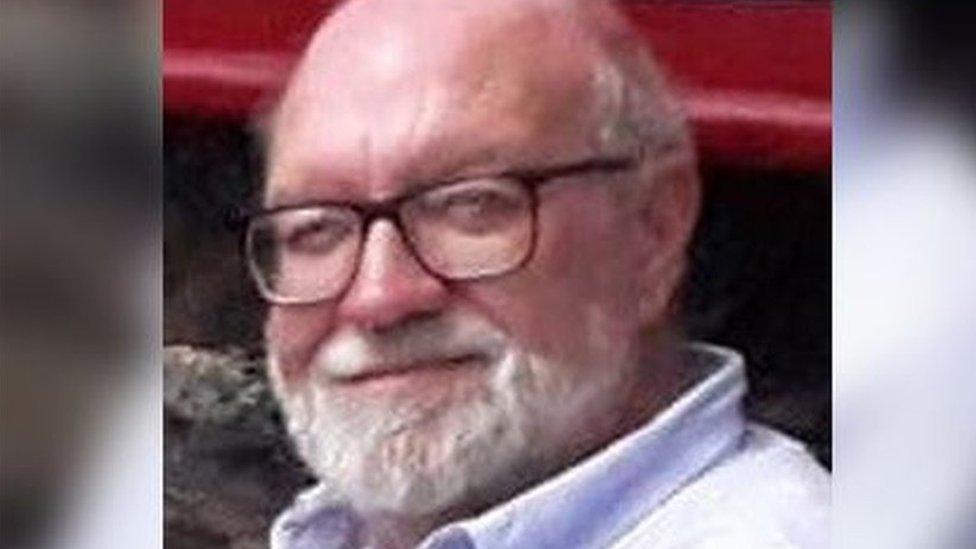Anglesey crossbow murder: Man guilty of Gerald Corrigan murder
- Published
How the crossbow killer was caught
A man has been found guilty of murdering a retired lecturer by shooting him with a crossbow as he tried to fix his satellite dish.
Gerald Corrigan, 74, suffered two holes in his stomach and damage to other organs in the Anglesey attack in April.
Terence Whall, 39, of Bryngwran, Anglesey, denied murder but was found guilty by a jury at Mold Crown Court.
Prosecutors said the dish was tampered with and Whall was hiding, armed with the weapon, waiting for Mr Corrigan.
A broadhead arrow used in the attack on Mr Corrigan had razor sharp edges used for hunting, jurors had heard.
It was designed to make hunted animals "rapidly bleed to death".

Gerald Corrigan died last May, three weeks after being shot outside his home with a crossbow bolt
Mr Corrigan suffered serious internal injuries and died of sepsis three weeks later.
He had been watching TV on the evening of 18 April 2019 when shortly after midnight he lost the signal. He went outside to adjust his ground-level satellite dish which is when he was shot.
Whall, a sports therapist, maintained throughout the trial that he was having sex with a man in a field on the night Mr Corrigan was shot.
Thomas Barry Williams denied this - saying the pair had only ever been friends.
But Whall's precise movements on the night of the killing were tracked by data from "black box" technology in a Land Rover, which belonged to his partner and which he had borrowed.
The prosecution said without this, he would have got away with his lies.

Gerald Corrigan's home - and the gap in the wall which gave the killer a clear sight to shoot him
Whall and another man, Gavin Jones, 36, of High Street, Bangor, were also found guilty of conspiring to pervert the course of justice and Jones was found guilty of arson of a motor vehicle.
Darren Jones, 41, and Martin Roberts, 34, had already pleaded guilty to arson.
All four will be sentenced on Friday.
Fiona Corrigan, Gerald's daughter, said: "The injuries caused by a crossbow are not designed just to kill... they are designed to mutilate.
"The particular weapon is designed to bring down big game... and that is what my dad became. Prey. We may never know why."
She said her father was a "good man. Just an average bloke enjoying his retirement", adding: "Our lives won't be the same without him."
Her brother Neale joined her in thanking all those who had helped the family after Mr Corrigan was shot, adding: "My father was so intelligent and wise. He said to me to be patient, and forgive."
Mr Corrigan's partner Marie Bailey said he had "meant the world to me".
"Each day my heart is broken. I feel it breaking again and I can do nothing," she said.
"To that sad, twisted broken soul who murdered him, I say if you have an ounce of humanity, any sense of decency, then you would tell us now why you have done this."
Det Ch Insp Brian Kearney of North Wales Police said after the verdict that Mr Corrigan was "the victim of a barbaric, medieval-style execution in one of the safest parts of the UK" and was "entirely innocent".
"Terence Whall believed he had planned and committed the perfect murder," he added.
"There was no forensic evidence, no direct eyewitness evidence to the shooting and in fact no-one saw him going to and from the scene."
While the exact motive was unknown, it was a "planned, premeditated execution from a cold-blooded killer", he said.
Karen Dixon of the Crown Prosecution Service described the case as "really unusual" in that there was no suspect at the start and only one piece of evidence to follow.
She said: "The telematics evidence from the Land Rover was key in showing that Terrence Whall was not only at the location at the time, but that he'd visited the night before, checking the area."
- Published24 February 2020

- Published5 February 2020

- Published27 January 2020

- Published28 January 2020

- Published29 January 2020

- Published3 February 2020
